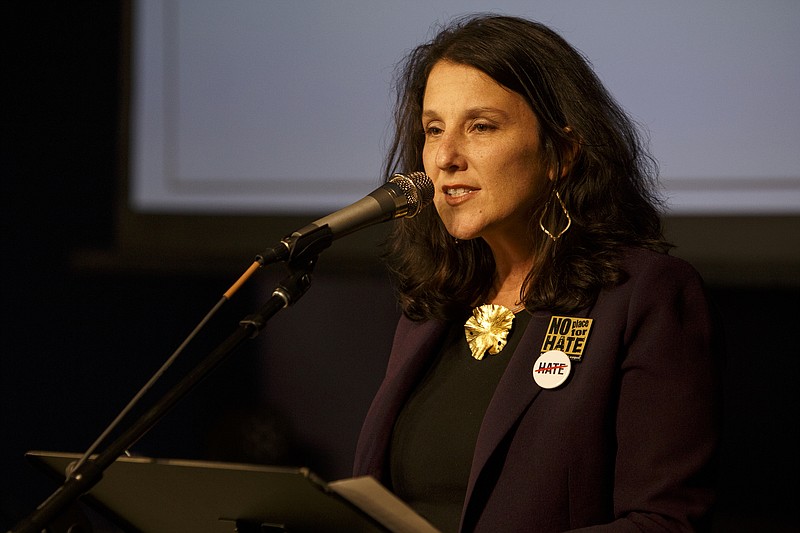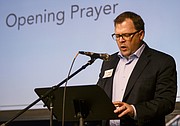On the eve of the fourth anniversary of the July 16, 2015, terrorist attacks, action teams for Chattanooga's Council Against Hate gave an update of their progress in developing strategies to address the root causes of hate.
Gunnery Sgt. Thomas Sullivan, 40; Navy Petty Officer 2nd Class Randall Smith, 26; Staff Sgt. David Wyatt, 35; Sgt. Carson Holmquist, 25; and Lance Cpl. Squire "Skip" Wells, 21, all died in the attacks.
"By being here tonight, by speaking up, by showing that you do not stand idly by - that even if you are not the bullied, you are going to stand up to the bully, we appreciate that," Alison Lebovitz, the council's co-chairperson, told the crowd gathered at The Camp House Monday evening.
"There's a lot of buzz about what you are doing right here," said Allison Goodman, director of the Anti-Defamation League's Southeast region. "People are paying attention to the good work in Chattanooga, and they want to find themselves similarly."
Goodman shared some data that the Anti-Defamation League has been compiling for the last century. She said that, while incidents of hate have been on the rise over the past two years, "we also sit in a place where people are actively and eagerly fighting against this narrative defining themselves in a vision of an America that they want to be."
"And that is a trend that also overwhelms and inspires me," Goodman said.
Last year and the year before saw the nation's second and third largest number of antisemitic incidents on record in 40 years, surpassed only in 2001, when the Sept. 11 terrorist attacks took place, she said. The audit looks at antisemitic acts of vandalism, harassment and assaults.
"Antisemitism has always been a barometer for hatred in general," she said. "Where there's antisemitism, other forms of awful hatred are there hand-in-hand."
Across the country, Goodman said, there's been a 17% overall increase in hate crimes, a jump of more than three times the previous year. That includes higher numbers of hate crimes against African Americans, Jews and Latinos.
Council Against Hate action items
Chattanooga’s Council Against Hate action items:1. Advocate for public policies to protect targeted constituencies from hate crimes.2. Push for more thorough and consistent reporting of hate crimes at a local, state and federal level.3. Engage young people in combating hate.4. Ensure educators have the skills and resources to identify discrimination and bias and how to properly address it.5. Engage the private sector by surveying employers and workers about workplace attitudes, cultures and incidents of bias.6. Improve the community’s media literacy around hate speech and radicalization.7. Create more cultural programming to foster interactions between people who wouldn’t normally interact.
"The data is not pretty," she said.
She pointed to Tennessee as having the most white supremacist events of any state. In 2018, 19% of all planned white supremacist events took place in Tennessee. That's compared to other states, such as Alabama, which had just 4%, Georgia at 5% and Arkansas at 9%, she said.
"These events have taken many forms," she said. "There are protests and counterprotests throughout the year on a number of different issues. We're seeing flash mob demonstrations."
She also pointed to white supremacist groups finding "strange comfort and welcome on college campuses, so much that they've actually been targeting college campuses in their propaganda and recruitment efforts."
Here at the University of Tennessee at Chattanooga, there were two incidents last year in which white supremacist fliers were distributed around campus, according to the Anti-Defamation League.
On Feb. 9, 2018, an unknown person or group distributed white supremacist fliers that featured Adolf Hitler and were placed on top of Black History Month fliers, the league reports.
Then on April 13, 2018, alt-right group Identity Evropa distributed fliers, some of which read, "Our Generation. Our Future. Our Last Chance." Others advertised a book called "White Identity" with the message: "Your professor is scared of this book."
But "it's not all dark and scary," Goodman said. "I'm immersed in this work every day, and I see so much more light than I do see darkness. The haters are not winning."
She pointed to a white supremacist rally that was supposed to start in Shelbyville, Tennessee, and end in Murfreesboro. The rally never made it to Murfreesboro, she said, because there was a counter-event that was called "Murfreesboro Loves."
Another example was a rally in Newnan, Georgia. The night before, families decorated the town with sidewalk chalk smiley faces, peace signs and hearts. Only 38 neo-Nazis showed up, 36 of whom were from outside of Georgia, she said.
Goodman said those two communities exemplified the trend of leaders and communities "shedding light on darkness and not letting it define them."
"They gather together, they took a stand and spoke up, and they won," she said. "This is what makes me really excited and proud of the proactive effort of this council against hate."
Members of the council, formed in 2018, spent several months researching ways to address hate at its core and foster and support an "open, tolerant and diverse Chattanooga." It first presented its findings to the public in early April and formed seven "action teams" that would be dedicated to developing ways to implement its findings, which included better public policy, better data gathering and better education on what hate, bias and discrimination are.
On Monday, those action teams offered updates about where they stand in their efforts.
One team is working on developing workshops for Hamilton County teachers, both in grade school and at the university level, to address differences in definitions of hate.
It also is working to create an anonymous survey for students to better gauge the "impact of hate in classrooms." It will allow students to report what their experiences are so community leaders can get a better picture of what reality looks like for students.
Another team is focused on the corporate side.
Through a "check your blind spots" bus tour, corporate leaders will be immersed in interactive exercises that will help them "understand the unconscious bias."
A date for a third meeting has not been set, but organizers pointed people to the council's website cha.city/againsthate to keep up with upcoming meetings.
Contact Rosana Hughes at rhughes@timesfreepress.com or 423-757-6327 with tips or story ideas. Follow her on Twitter @HughesRosana.


